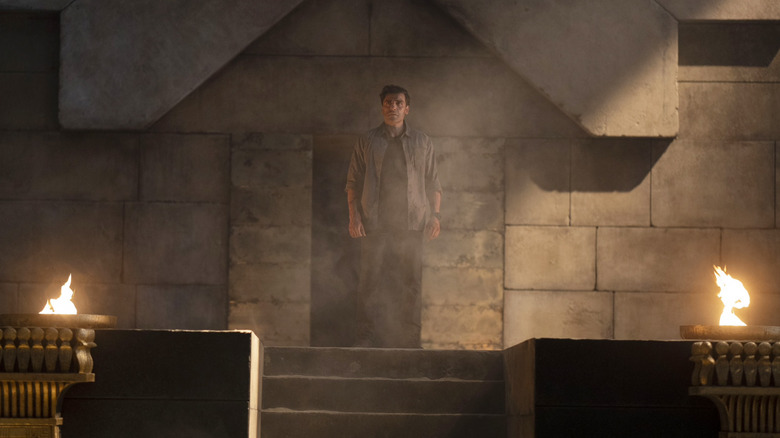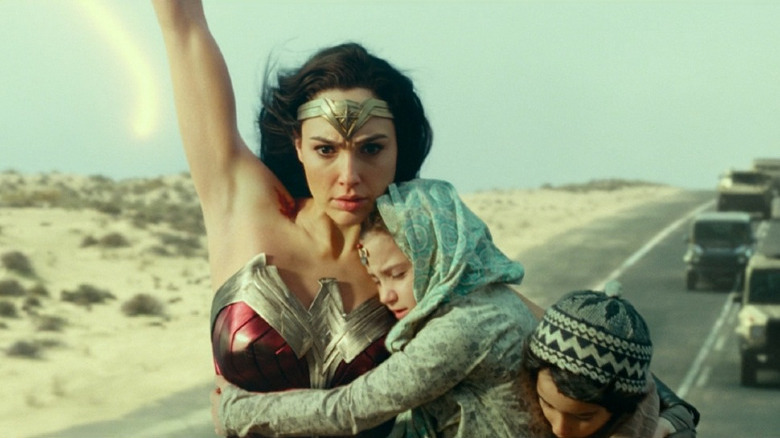Moon Knight Director Mohamed Diab Has A (Rightful) Bone To Pick With Hollywood's Depiction Of Egypt
Marvel's "Moon Knight" series is intriguing for many reasons, not least of which being that it's the first entry in the Marvel Cinematic Universe to tackle Egyptian mythology. The show centers on Marc Spector (Oscar Isaac), a mercenary with dissociative identity disorder who gains super-powers upon becoming the avatar for the Egyptian moon god Khonshu (voiced by F. Murray Abraham). Egyptian writer-director Mohamed Diab ("Cairo 678," "Amira") executive produced and directed several episodes of the series, making it the rare major U.S. studio production to explore Egypt and its culture under the watch of an Egyptian filmmaker. And rest assured, Diab is all-too-aware of Hollywood's historically poor track record when it comes to depicting the country and its people.
In an interview with SFX Magazine (via GamesRadar+), Diab talked about his "Moon Knight" pitch and how it was shaped by his frustration with the typical portrayals of Egypt in U.S. cinema (which is not to suggest that U.S. television has been a whole lot better in this regard):
"In my pitch, there was a big part about Egypt, and how inauthentically it has been portrayed throughout Hollywood's history. It's always exotic – we call it orientalism. It dehumanizes us. We are always naked, we are always sexy, we are always bad, we are always over the top."
Wonder Woman 1984's Egypt scene 'was a disgrace for us'
Hollywood's orientalist approach to portraying Egypt is nothing new, of course, dating back to (at least) the 1932 movie version of "The Mummy." Otherwise beloved action-adventure films like "Raiders of the Lost Ark" and the 1999 "Mummy" remake are similarly cringe-worthy in the way they "other" people and places in Egypt, like Diab noted. Frustratingly, things haven't gotten much better in the decades since those movies came out, either. Case in point: 2020's "Wonder Woman 1984" features an action scene set near Cairo, Egypt that aspires to homage classic 1980s fare like the "Indiana Jones" films but (to quote Roxana Hadadi's excellent piece on the topic for Slate) mostly just "revives the era's noxious ethnic stereotypes along with its Members Only jackets."
Diab called out "WW84" specifically for perpetuating Middle Eastern stereotypes while also discussing how often Egypt is "played" by a different country entirely on-screen:
"You never see Cairo. You always see Jordan shot for Cairo, Morocco shot for Cairo, sometimes Spain shot for Cairo. This really angers us. I remember seeing 'Wonder Woman 1984' and there was a big sequence in Egypt and it was a disgrace for us. You had a sheik – that doesn't make any sense to us. Egypt looked like a country from the Middle Ages. It looked like the desert."
Between the discourse around "Dune" (2021) and its lack of Middle Eastern cast or creatives despite its source material's abundant Middle Eastern inspirations and Diab's recent comments about the upcoming "Black Adam" movie and its own problematic approach to its obvious Egyptian influences, it seems Hollywood is finally starting to face a long-overdue reckoning for its failures in this area. Diab, for his part, added that he made a conscious effort to ensure that "Moon Knight" acts as a step forward for the industry in this respect, rather than perpetuating the same problems:
"[It's] part of the show because it's part of the comic book. It's part of how he gets his powers. It's ingrained in it. There was definitely room to play [in 'Moon Knight'] but keep it as authentic as possible, in the realm of being fantastical. Even in the original comic books they did a great job of researching and trying to make Egypt authentic."
"Moon Knight" begins streaming on Disney+ on March 30, 2022.

